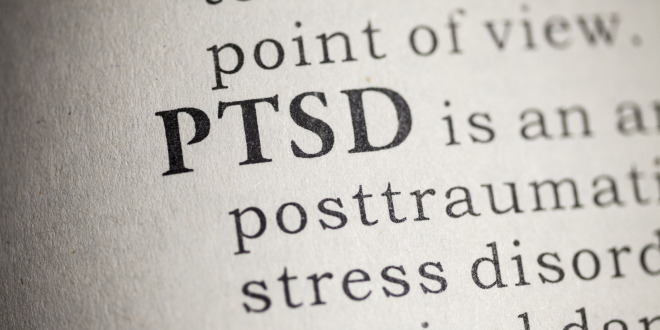by Michelle Sutton-Kerchner
This mental health condition can disrupt your days and nights. There is help …
Stress is part of everyone’s life. However, everyday stress should not be confused with post-traumatic stress disorder (PTSD), which is the lasting effect of a traumatic event. Usually the event is physically violent in nature, involving death, threats, or serious injury. It may have transpired recently or during the distant past of childhood.
Adjusting to a traumatic occurrence varies by individual. For some, time and proper care result in healing. Others experience long-term symptoms, which may span for years and increase in severity. A diagnosis of PTSD can validate feelings, and offer an individual a chance at recovery.
This Veterans Day, when taking advantage of store sales, autumn weather, and pumpkin-flavored treats, also take inventory. Is a loved one suffering from PTSD?
Although PTSD is not limited to veterans, it is common in that population. Military personnel often face continuous exposure to violence and threats to safety. This can have devastating effects on the strongest among us.
Reassert Control

The thought of obtaining support may seem overwhelming. Depression and anxiety often accompany PTSD, with their symptoms of fatigue and hopelessness. Reach for help. A simple mention of your concern to a friend, family member, coach, or religious official can start you on the path to wellness. You also may consider contacting your healthcare provider. There aren’t set steps or rules for who and how. Each person is unique. Begin wherever you stand today and see where it leads you.
Practice Patience
Once you give your situation a voice, listen to it. Acknowledge pain and fears. Often, past injuries and struggles resurface. As a result of a current PTSD trigger, you also may struggle with old wounds long ago settled in your mind and heart. It takes patience. When frustrated, throw in more time. Therapies, treatments, medication all require time to show benefits. Be gentle with yourself on this journey. Relief comes in its own time and way.
Become an Expert
As you learn the symptoms and causes of PTSD, you will feel the hope of solidarity. You are not alone. You are not “damaged goods.” Knowledge about PTSD can explain symptoms, from the nightmares to personality shifts.
Being able to identify and understand your condition can help you cope effectively. Simply knowing your feelings are the result of PTSD can make them more bearable. The issue is not you. It is your PTSD. Don’t let your condition define you.
Take Care of Yourself
Quality sleep may be difficult. Night terrors and harsh memories may disrupt your sleep. Anxiety can lead to insomnia. A vicious cycle can ensue. This may cause reliance on unhealthy coping mechanisms like substance abuse or stress-eating.

Find a healthy outlet. Physical activity, including exercise, can help keep appetite on track and lead to better sleep habits. Focus on cardio fitness for a healthy exhaustion and appetite.
Don’t forget the power of nature combined with hard work and relaxation. Wood chopping, anyone? Fly fishing? These activities can be helpful. Mindfulness makes repetitive actions meditative. Everything from waxing the car to washing the dishes can help clear your mind.
Once you realize you aren’t alone, reach out to others. It may be a combat buddy or your spouse. Invite others into your heart. You don’t need to discuss traumatic incidents. Being among those who care about you is soothing in itself.

Keeping quiet does not help anyone. Your loved ones are likely suffering with you. Perhaps they are reliving their own difficulties through your experience. Try not to withdraw. It is what PTSD temps you to do, so it can remain an unwanted intruder. Start a conversation. Initiate an embrace. You need it, and your loved ones may crave it from you.
Support Groups
A support group is a powerful tool. Share camaraderie with those who have experienced similar trauma or events. Support groups are available for a variety of health issues and populations.
A journey of a thousand miles begins with a single step.
–Lao-tzu
Sources
Mayoclinic.com
Image Credits
Chat: flickr.com/photos/pagedooley/5532251255/
Army crunches: www.flickr.com/photos/dvids/4834404563/
Missing you: flickr.com/photos/cutzerophotography/7409562510/
 Fitness & Wellness News Your Source for Fitness News, Wellness News, Health News, and Nutrition News!
Fitness & Wellness News Your Source for Fitness News, Wellness News, Health News, and Nutrition News!




